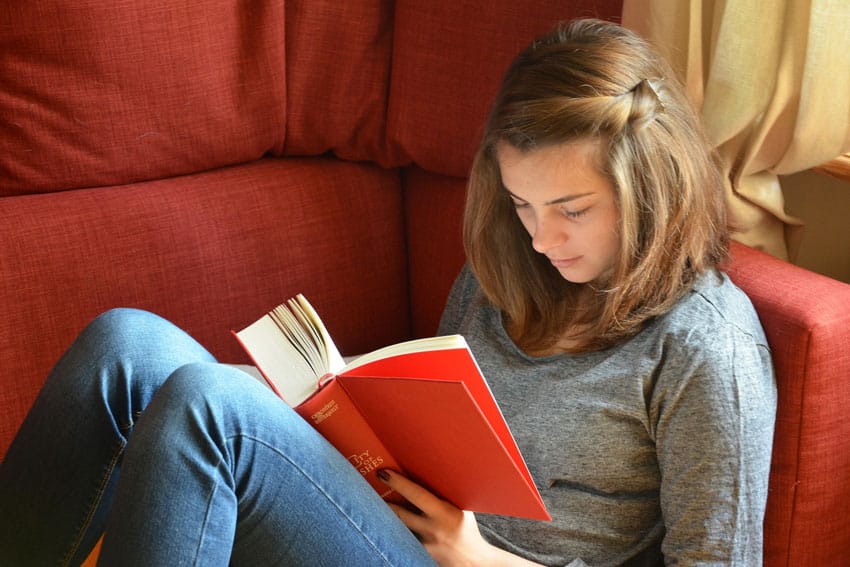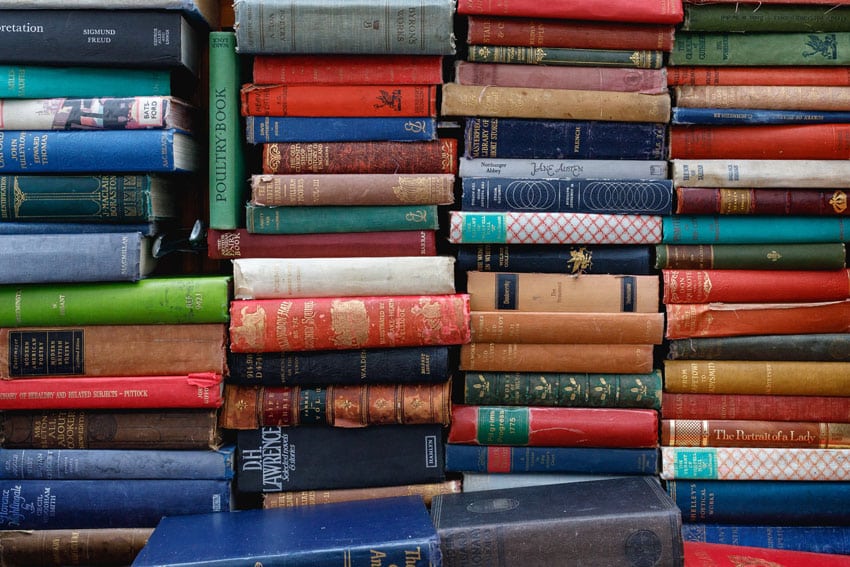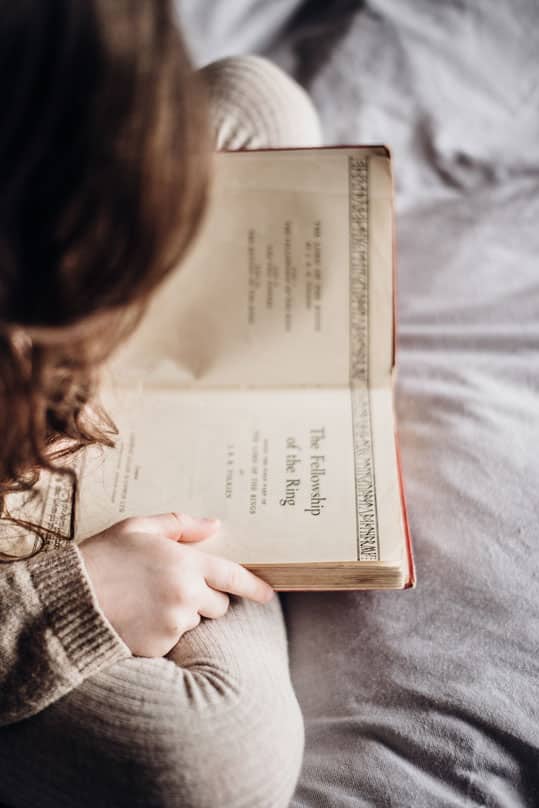
A frequent question: What books are good for Catholic teenagers and young adults looking to deepen their faith? I have some suggestions!
Your Questions, God’s Answers by Peter Kreeft
This book is written specifically for teenagers, using a question-and-answer format. It’s solid but chatty, sometimes a little goofy, but never condescending, and the answers are rooted in scripture. Good for launching conversations, or for quick lessons when you don’t have a lot of time. Written in 1994, so it doesn’t include issues that have become prominent very recently (for instance, gender identity), but asks many questions that teenagers do want to know the answer to.
The History of the Church from The Didache Series
My older kids go to a secular public school, and this is the book we haul out every time one of them takes a history course. There’s always some correcting to do! This is the only book we have from the Didache series, but I have heard that the rest is also great. If I were teaching Church history to older kids, this is the book I would choose. Factual and objective.
The How-To Book of the Mass by Michael Dubruiel. A systematic guide that’s accessible but in no way lightweight. Suitable for teenagers or for adults who want to participate more fully and deeply in the Mass. This is a practical and forthright manual with lots of theology packed into a short work. Dubruiel has a great gift of clarity, and the format lends itself to short but illuminating lessons.
How Far Can We Go? A Catholic Guide to Sex and Dating by Leah Perrault and Brett Salkeld. This isn’t a perfect book, but it’s upbeat and clear, and dispels the idea that Catholic view of sexuality is all about saying no. It also spells out the very reasonable, but somehow undertaught notion that different levels of intimacy are appropriate for different kinds of relationships, and it’s not an “all or nothing” deal. Also avoids the pitfall of trying overly hard to be hip and relevant.
YouCat A serviceable Catechism designed especially for teenagers at the request of Pope Benedict XVI. It isn’t overly cutesy or pandering, but provides a reasonably simplified version of the Catechism of the Catholic Faith, which is beautiful and profound but a bit daunting.

Theology for Beginners by Frank Sheed A deeper dive. Lively and challenging writing that systematically illuminates our faith for Catholics ready to proceed beyond grade-school catechism. The chapters on the Trinity are indispensable, and can be read over and over again, because a mystery is a deep pool with any number of thrilling things in it, not an impenetrable wall to bonk your head against.
Jesus and the Jewish Roots of the Eucharist by Brant Pitre. Great for illuminating the Mass and, well, all of salvation history. With anti-semitism on the rise, this book is a timely read, but it’s also an enjoyable one. Pitre is a professor who knows how to get your attention and sweep you up in his enthusiasm.
Pro-Life Answers to Pro-Choice Arguments by Randy Alcorn A clear and concise book with lots of useful information. It is somewhat outdated, but it answers questions that don’t change with the times. Helpful for teens whose friends are mostly pro-choice.
A Consistent Life: The young advocate’s guide to living peace & justice daily. I’m taking a chance and recommending a book I haven’t read, because it’s co-written by Rehumanize International’s Aimee Murphy, for whom I have enormous respect.
The blurb: This holistic guide offers activists young and old ways to support the marginalized and rehumanize the dehumanized. In working for peace and justice daily, readers will participate actively in education, discourse, and action to uphold the inherent dignity of the preborn, the elderly and disabled, the incarcerated, and those at risk from policy brutality, racism, poverty, human trafficking, and war. Activities include direct service to those at risk from violence, advocating for human-centered public policy, raising awareness, and perhaps most importantly: celebrating life.
In the Beginning: A Catholic Understanding of the Story of Creation and the Fall by Pope Benedict XVI . A short work compiling four homilies and an essay. I’m still reading this one, so here is the blurb:
“While the stories of the world’s creation and the fall of humankind have often been subjected to reductionism of one sort or another ― literalists treat the Bible as a science textbook whereas rationalists divorce God from creation ― Ratzinger presents a rich, balanced Catholic understanding of these early biblical writings and attests to their enduring vitality.” A good book for kids who have been told that you have to choose between science and religion. BXVI’s voice is so kindly, wise, and rational, you will fall in love with him.

FICTION:
Fiction for spiritual reading is a little trickier. I’m not a fan of books that use stories to deliver messages or lessons. Stories are what they are, and if you can reduce them to a few sentences that explain what they mean, then why not just write those few sentences?
But fiction has the power to tell truths in a way that seizes your attention and lodges in your memory. Here are some fictional works that many (not all!) Catholics have found illuminating, and would be appropriate for older teenagers:
Till We Have Faces C.S. Lewis’ compelling reimagining of the Cupid and Psyche myth, with a heart-wrenchingly unreliable narrator whose terrible sins are so very, very understandable. It’s about love and fidelity and their counterfeits. Not a word out of place.
The Lost Princess by George MacDonald
A strange, gorgeous and harrowing fairy tale with unshakeable images of sin and repentance. Not as famous as MacDonald’s The Light Princess (also recommended) or the books about Princess Irene and Curdie (to put to rest any notion that the Catholic Church doesn’t think much of women), but not to be missed. It’s a long short story. The language is a bit convoluted, but a solid reader will get the hang of it.
The Brothers Karamazov by Fyodor Dostoevsky Uh, if you have plenty of time or are a fast reader. This is the book that made me realize once and for all that abstract love is worse than useless. Some of the scenes are absolutely devastating, so let tender-hearted readers beware; but it’s on my short list of novels that every human should read.
Not strictly fiction:
The Screwtape Letters and The Great Divorce by C.S. Lewis
These books were both written to illustrate lessons and ideas about sin, temptation, love, and redemption, so they’re not straight fiction.
Screwtape is a series of letters written by a senior demon to a junior learning how to tempt human beings. Much imitated, but no one has ever come close. This book is often hilarious and often painfully illuminating, but probably not a good choice for scrupulous or anxious readers. A little knowledge of history (it’s written about a soul during World War II) is helpful, but not absolutely necessary.
The Great Divorce is somewhat less well known. It’s a riff on The Divine Comedy, and has the protagonist taking sort of a field trip to the outskirts of Heaven, where lost souls are given the chance to see their lives clearly and make a final choice. Very clever, often funny, sometimes heartbreaking.
***
To my list, I’d like to add a book of stories about saints, but I haven’t ever found one that’s just right. What can you recommend?
